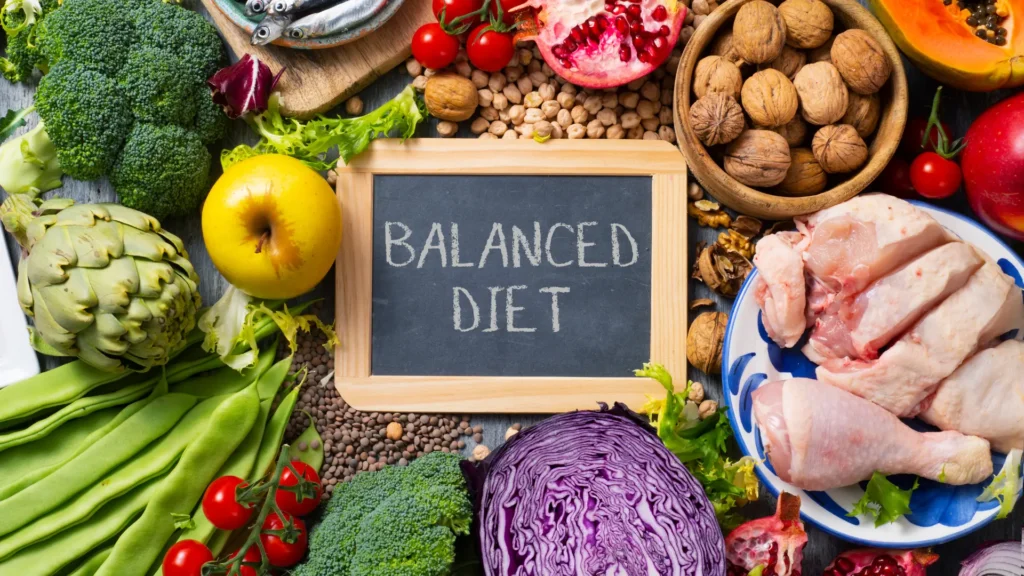Pregnancy is an incredible time of transformation, filled with anticipation as you nurture a new life. We often hear the phrase “eating for two,” but what does that truly mean? It’s less about doubling your food intake and much more about doubling the quality and focusing on nutrient-dense foods that support both your well-being and your baby’s intricate development. Good nutrition is, without doubt, a cornerstone of a healthy pregnancy.
My name is Dr. Vrushali Pillai, and as a Senior Consultant Obstetrician & Gynaecologist at Borneo Hospital, Thane – part of the Borneo group serving families across Thane, Nashik, Chhatrapati Sambhaji Nagar, and Raipur – guiding expectant mothers towards optimal health is central to my practice. We believe comprehensive antenatal care includes empowering you with the knowledge to nourish yourself and your baby effectively.
This article aims to provide clear, practical Nutrition Tips specifically for expecting mothers in India. We’ll cover the essential nutrients you need more of, suggest healthy food choices within our rich dietary landscape, touch upon weight gain and hydration, and highlight foods best avoided during this crucial time.
Please remember, these are general guidelines. Your individual nutritional needs can vary based on your health, weight, and specific circumstances. Always discuss your personalised dietary plan and any necessary supplements with your doctor at Borneo Hospital.
Why is Nutrition So Crucial During Pregnancy?
The food you eat during pregnancy provides the vital fuel and building blocks for incredible processes:
- Baby’s Growth & Development: Every organ, bone, tissue, and system in your baby’s body is built from the nutrients you consume. Certain nutrients, like folic acid, are critical during specific early developmental windows for preventing birth defects. Adequate nutrition throughout pregnancy supports healthy growth and optimal birth weight.
- Mother’s Health & Well-being: Pregnancy places significant demands on your body. Good nutrition helps you maintain energy levels (combating fatigue!), prevents deficiencies like anaemia (a common concern in India), supports the growth of the placenta and uterus, builds stores for labour and delivery, and prepares your body for breastfeeding, if you choose to do so.
- Reducing Pregnancy Complications: While not a magic bullet, a balanced diet contributing to healthy weight gain can lower the statistical risk of developing complications such as gestational diabetes and pregnancy-induced high blood pressure (pre-eclampsia). Good nutrition is also linked to reduced risks of preterm birth and low birth weight babies.
- Laying Long-Term Foundations: The nutrition received during pregnancy can have lasting impacts on both your future health and potentially influence your child’s health trajectory later in life. Healthy eating habits established now benefit everyone.

Key Nutrients: What Your Body Needs More Of
During pregnancy, your requirements for certain vitamins and minerals increase significantly. Focusing on these is key:
- Folic Acid (Folate / Vitamin B9): Absolutely Critical! This B vitamin is vital before conception and especially during the first trimester to prevent serious birth defects of the baby’s brain and spine (neural tube defects).
- Action: All women planning pregnancy or who could become pregnant should take a daily supplement containing at least 400-800 mcg of folic acid (follow your doctor’s advice). Continue this throughout the first trimester.
- Food Sources: Include folate-rich foods like dark green leafy vegetables (palak/spinach, methi/fenugreek leaves), lentils (dals), beans (chana, rajma), citrus fruits, and fortified grain products. Supplementation is still essential.
- Iron: Needs nearly double during pregnancy to support your increased blood volume and provide iron for the growing baby and placenta. Preventing iron-deficiency anaemia is crucial for avoiding fatigue, weakness, and potential complications like preterm birth.
- Action: Include iron-rich foods daily: lean red meat, poultry, fish, eggs, dals, legumes, spinach, beetroot, jaggery (gur – use in moderation), dried fruits (dates, anjeer/figs). Pair these with Vitamin C-rich foods (amla, guava, lemon, tomatoes, capsicum) to boost absorption. Avoid drinking tea or coffee right around meal times as they inhibit iron absorption.
- Supplementation: Your doctor at Borneo Hospital will monitor your haemoglobin and almost always prescribe iron supplements during pregnancy; take them as directed.
- Calcium: Essential for building your baby’s bones and teeth without depleting your own stores.
- Action: Aim for adequate daily intake through sources like milk, yoghurt/curd, paneer, cheese, ragi (nachni), sesame seeds (til), almonds, soybeans, and green leafy vegetables like broccoli and kale.
- Vitamin D: Works with calcium for bone health and plays a role in immune function. Sunlight exposure helps your body make it, but deficiency is very common in India.
- Action: Include sources like fatty fish, eggs, and fortified milk/foods. However, supplementation is usually required – your doctor will advise on the correct dosage based on your needs and potentially blood test results.
- Protein: Vital for building all of baby’s tissues, organs, and muscles, as well as supporting your own body’s changes (uterus, placenta, breasts, increased blood volume).
- Action: Ensure good protein sources are part of most meals and snacks. Excellent Indian options include all types of dals and legumes, paneer, tofu, eggs, milk products, nuts, seeds, lean chicken, and fish.
- Omega-3 Fatty Acids (especially DHA): Crucial for your baby’s brain, nerve, and eye development.
- Action: Include sources like fatty fish (salmon, sardines, mackerel – limit to 1-2 servings/week of low-mercury types), walnuts, flaxseeds (alsi – grind them), chia seeds. If your diet is low in these, discuss the possibility of an Omega-3 supplement with your doctor.
- Iodine: Necessary for healthy thyroid function and critical for baby’s brain development.
- Action: Using iodised salt in cooking is the primary way to ensure adequate intake in India. Dairy products and seafood are also sources.
- Other Vitamins & Minerals: A varied diet with plenty of colourful fruits, vegetables, and whole grains generally provides other essential nutrients like Vitamin C, Vitamin A (be cautious with high-dose supplements/liver), B vitamins, and Zinc. Your prescribed prenatal multivitamin helps fill any gaps.
Building a Healthy Pregnancy Diet: Practical Nutrition Tips for Indian Meals
Eating well during pregnancy doesn’t mean giving up your favourite Indian foods; it often means making balanced choices and smart swaps.
- Embrace Whole Foods: Focus your meals around fresh ingredients like vegetables, fruits, dals, whole grains, nuts, seeds, and lean proteins. Minimise heavily processed or packaged foods.
- Balanced Thali Power: Use the traditional Indian thali as inspiration for balanced meals:
- Grains: Choose whole wheat roti/chapati, brown rice, or millets (jowar, bajra, ragi) over white rice or maida products most of the time.
- Protein: Always include a generous portion of dal, sambar, chickpeas, rajma, paneer, tofu, egg curry, fish, or lean chicken.
- Vegetables: Fill a good portion of your plate with colourful cooked vegetables (sabzi/bhaji/poriyal). Aim for variety throughout the week. Include leafy greens regularly.
- Curd/Yoghurt: A serving of plain curd/dahi or raita adds calcium and protein.
- Fruit & Veggie Boost: Aim for at least five servings daily. Have fruit for snacks. Add grated carrots or chopped spinach to roti dough. Include salads like kachumber.
- Healthy Fats: Use cooking oils like groundnut, mustard, sunflower, or rice bran oil in moderation. Include nuts and seeds as snacks or added to dishes. Limit excessive ghee, butter, cream, and deep-fried items.
- Smart Snacking: Choose nutrient-dense snacks over empty calories. Ideas: fruit, plain yoghurt, handful of nuts/seeds, roasted chana/makhana, sprouts chaat, vegetable sticks, boiled egg, small portion of poha/upma with veggies.
- Listen to Cues (Mindfully): Eat when hungry, stop when satisfied. If nausea strikes (especially first trimester), try small, frequent, bland meals. Don’t force-feed yourself, but try to ensure regular intake. Honour occasional cravings but balance them with healthy choices overall. These Nutrition Tips are about balance.
- Healthy Cooking: Prioritise methods like steaming, pressure cooking, baking, grilling, and light stir-frying. Limit deep-frying and heavy, creamy gravies. Use spices for flavour!
Healthy Weight Gain During Pregnancy
Gaining an appropriate amount of weight during pregnancy is important for both you and your baby.
- Why Monitor?: Gaining too little weight can increase risks for the baby (e.g., low birth weight), while gaining too much increases risks for both mother (GDM, hypertension, C-section) and baby.
- Personalised Guidance: Recommended weight gain depends on your pre-pregnancy BMI. Your doctor at Borneo Hospital will track your weight gain and provide personalised advice.
- Focus on Quality: Ensure weight gain reflects nourishment for you and baby, coming from healthy, nutrient-dense foods, not just empty calories.
Hydration: Drink Up!
Staying well-hydrated is crucial during pregnancy.
- Increased Needs: Your fluid needs increase to support higher blood volume, amniotic fluid, and foetal circulation.
- Water is Best: Aim for 8-10 glasses (or more) of water daily. Sip throughout the day.
- Other Healthy Options: Milk, fresh buttermilk (chaas), clear soups, fresh lime water (nimbu pani – low sugar), and tender coconut water are also good choices.
- Limit: Sugary drinks, excessive tea/coffee (due to caffeine).

Foods and Substances to Avoid or Limit During Pregnancy
For the safety of your developing baby, some items should be strictly avoided or limited:
- Alcohol: Complete avoidance is the safest approach. No amount is proven safe during pregnancy.
- Smoking/Tobacco: Strictly avoid all forms (including smokeless tobacco and passive smoke).
- High-Mercury Fish: Avoid large predatory fish (like shark, swordfish). Limit tuna. Choose safer options like salmon, sardines, pomfret if you eat fish.
- Raw or Undercooked Foods: Avoid raw/undercooked meat, poultry, seafood (including some types of sushi), and raw eggs (check homemade mayonnaise, desserts). Cook everything thoroughly.
- Unpasteurised Dairy/Juices: Choose only pasteurised milk, cheese, and juices to avoid harmful bacteria like Listeria. Check labels.
- Unwashed Produce: Wash all fruits and vegetables very well before eating.
- Excessive Vitamin A: Avoid high-dose supplements and large amounts of liver.
- Caffeine: Limit intake (generally under 200mg/day – check with your doctor). That’s roughly 1-2 small cups of instant coffee or 2-3 cups of tea.
- Herbal Products: Discuss any herbal teas or supplements with your doctor, as many lack safety data in pregnancy.
Addressing Common Concerns
- Nausea: Eat small, frequent meals; try plain crackers or toast before getting out of bed; sip ginger tea; avoid strong smells or greasy foods.
- Heartburn: Eat smaller meals; avoid lying down right after eating; limit spicy or fatty foods.
- Constipation: Increase fibre intake gradually (whole grains, fruits, vegetables), drink plenty of water, and engage in gentle, doctor-approved activity.
Getting Personalised Advice at Borneo Hospital
Remember, these are general Nutrition Tips. Your specific needs may vary. At Borneo Hospital, your obstetrician, like myself, will discuss your nutritional needs. If you have specific conditions like gestational diabetes, anaemia, twins, or other concerns, we can provide referrals to experienced nutritionists for personalised diet planning to ensure you and your baby get exactly what you need.
Nourishing yourself well during pregnancy is one of the most important ways you can support your own health and give your baby the very best start in life. Following these Nutrition Tips – focusing on a balanced diet rich in whole foods, ensuring adequate intake of key nutrients like folic acid and iron, staying hydrated, gaining weight appropriately, and practicing food safety – lays a strong foundation.
View healthy eating not as a restriction, but as an act of love and care for yourself and your growing child. Be patient with yourself, make gradual changes, and always discuss your personalised nutritional needs with your healthcare team at Borneo Hospital. We are here to support you on this incredible journey!



